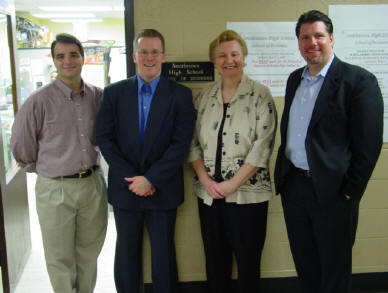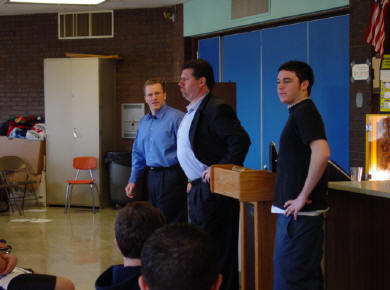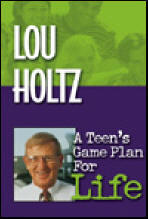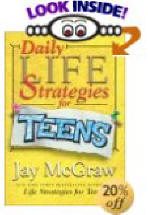
2004 - 05
MEETING DATES
October 7
December 2
February 10
April 7
May 12
Contact Susan
Gubing
(631)382-2977
Fax: (631)382-2974
Email: sgubing@smithtown.k12.ny.us
 
|
| |
|
A forum for our students in the
School of Business.
Presented by:
Visionaries Chuck and Tim Healy
of
Motivate Me
The nation's premier brother tandem for
professional development!
www.motivate-me.com (631)754-8780
|

Phil Como, Tim Healy, Sue Gubing and Chuck Healy. |
 |
|
| |
|
|
 |
After decades of helping to mold teenagers into adults as a highly
successful football coach, including a national championship as the coach
of the Notre Dame Fighting Irish, Lou Holtz shares a common sense message
with teens in an easily understood game plan for life.
He speaks
clearly and persuasively to a generation that is “being asked to make
important decisions that have adult consequences earlier than any previous
generation.” “In today’s social climate,” he tells you, “ your ability to
know how to make good decisions becomes more important than ever before.”
Lou Holtz is a highly sought-after speaker and author who for years has
challenged and motivated adults. Now in a book he spells out his tested,
proven game plan for life. Teens that want to define their life goals and
then go about reaching them will want to read A Teen’s Game Plan For
Life.
Assignment:
Read an excerpt here and summarize in 5 sentences his definition
of attitude. |
|
 |
This book is the first guide to teenage
life that won't tell you what to do, or who to be, but rather how to live
life best. Employing the techniques from Dr. Phillip McGraw's Life
Strategies, his son Jay provides teens with the Ten Laws of Life which
make the journey to adulthood an easier and more fulfilling trip. This
book tackles the challenges of adolescence like no other. A great read for
teens and those who care about them.
The 10 Life Laws:
1. "You either get it, or you don't."
2. "You create your own experience."
3. "People do what works."
4. "You cannot change what you do not acknowledge."
5. "Life rewards action."
6. "There is no reality, only perception."
7. "Life is managed. It is not cured."
8. "We teach people how to treat us."
9. "There is power in forgiveness."
10. "You have to name it before you can claim it."
Assignment: Choose three of the above
laws and summarize your interpretation of each law. |
 |
This book is a unique roadmap into
adulthood. Designed to stimulate your mind as well as your heart because
when you know when to listen to both it'll be easier to negotiate the
challenges you face. If you like to think, wonder, question and challenge,
and want a better grip on this “life” thing, this is the book for you.
To overcome many of the common roadblocks we all face in
life, getting a handle on the following is the most important guide:
- Become competent—don’t expect to have self-esteem
without becoming competent
- Master your feelings—don’t let your feelings run the
show
- Break the silence—don’t silently scream instead of
making yourself known
- Get healthy power—don’t avoid learning about power
- Face the serious stuff—don’t hide the really
important things you're experiencing
- Find an identity—don’t avoid the struggle to find
yourself
- Learn to stake out the extremes—don’t live only in
the extremes.
Assignment: Choose three of the above
suggestions and in 5 - 10 sentences give an examples in your life on how
you have applied these suggestions. |
 |
Stedman Graham's book is both powerful and practical. He meets teens on their own turf, and seeks to empower them by
helping them believe in themselves. Mastering the "rules of the road" is
essential. His tips include discipline, good attitudes, working hard on
the things you are passionate about, overcoming procrastination, and
understanding who you are.
He emphasizes the value of who you are is how
people identify you. He warns of the pitfalls inherent in today's
society; that is, people telling you what you cannot do, and people
inflicting their pain on you. He understands that there are people who
will always try to "knock you down," but stresses that you can be
successful based on yourself.
"Sometimes the things you don't do are more
important than what you do do," he offers, and further implores teens to
do what adds value to you. Mr Graham's concept of a responsible
partnership between parents, the system and the child is commendable.
Assignment: Summarize in 5 - 10 sentences
Mr. Graham's beliefs and how they apply to you. |
 |
The teenage years are considered a golden age in our life
when we can simply have fun!
I have to admit the person I am now, is quite a
different character from what I was before I read the book, "The 7
Habits of Highly Effective Teens". A bit like a mentor who taught me to
see the light, I have learned to appreciate so much more in life. The
book really reaches out and touches each person individually, and helps
them find the best in themselves.
Sean Covey has created 7 "habits" to help teenagers
make the most out of their teenage life. Illustrated with funny
cartoons, easy to read fonts, and simple language, not once was I ever
bored when I read the book.
Speaking from the heart, Covey brings back memories of
his own personal past and shows us how we can change things before they
actually happen. For example, he spends a chapter talking about the
importance of being a good friend. After reading that chapter.
I tried using some of the tips he mentioned into my
real life scenario. And guess what? It really works! I have learned to
become a much better listener, a better advice giver, and better at
keeping secrets. All that was deprived from one chapter.
I was just surprised to find out that a lot of the
things he said related directly to me, therefore it made it really
personal. If Covey was able to make a personal connection with me, I am
sure he can do so with everyone else. I speak as a teen to a teen; read
it. This will be the most memorable piece of
writing you will remember throughout your teenage career.
Assignment:
Summarize in 5 - 10 sentences Mr. Covey's beliefs and how they apply
to you. |
 |
Stephen R. Covey has helped millions of
readers attain professional success and personal fulfillment. With
penetrating insight Dr. Covey reveals a pathway for living with fairness,
integrity, honesty, and human dignity -- principles that give us the
security to adapt to change and the wisdom and power to take advantage of
the opportunities that change creates.
 | Our character, basically, is a composite of our habits. Because they
are consistent, often unconscious patterns, they constantly, daily,
express our character and produce our effectiveness...or
ineffectiveness. |
 | If we want to change a situation, we first have to
change ourselves. And to change ourselves effectively, we first have to
change our perceptions. |
 | We simply assume that the way we see things is the way they
really are or the way they should be. And our attitudes and behaviors
grow out of those assumptions. |
Assignment: Comment on all of the above beliefs
in 5 - 10 sentences and give an examples in your life on how you
have applied these rules. |
 |
Are You Ready For the Secret That Has Made Countless
Millionaires?
Napoleon Hill
- Thoughts are things.
Whatever the mind of a man can conceive and believe it can achieve!
-
Desire: The starting point of all achievement.
Imagine yourself a millionaire.
- Faith: Believe in yourself and others.
- Autosuggestion: The medium for influencing the
subconscious mind.
- Specialized Knowledge: Personal experiences or
observations.
- Imagination: The workshop of the mind.
- Organized Planning: The crystallization of desire
into action.
- Decision: The mastery of procrastination.
- Persistence: The sustained effort necessary to
induce faith.
- Power of the Master Mind: The driving force.
- Creativity: Develop the genius within you.
- The Subconscious Mind: The connecting link -
energize yourself.
- The Brain: A broadcasting and receiving station
for thought.
- The Sixth Sense: Inspiration and imagination.
- The Six Ghosts of Fear: Fear of poverty,
criticism, ill health, loss of love, old age, and death.
Here are some more modern examples of people who state
as fact that they were inspired to greatness by the Think and Grow
Rich philosophy.
Wally "Famous" Amos (Famous Amos Cookies)
Mary Kay Ash (Mary Kay Cosmetics)
Tom Monaghan (Founder, Dominos Pizza)
Melvin Powers (Founder, Wilshire Book Company)
Fran Tarkenton (Hall of Fame Football Player)
Simply put, the state of mind to acquire great riches is
within your grasp. But creating that state of mind is the hard part...unless
you have the right tools.
Assignment: In 5 - 10 sentences indicate how
you will become a millionaire. |
| ALL MUST DO |
SUMMARY OF YOUR LISTENING AND INTERPRETATION ABILITIES:
After attending the "Motivate Me" seminar, summarize in ten sentences or
more, how the speakers and above materials will change your outlook on
life and career success.
|
| |
|
